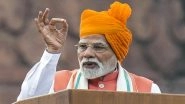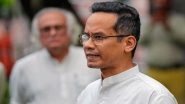Washington, Dec 4 (PTI) The United States has cautioned countries against choosing suppliers of 5G networking equipment merely on the basis of price and speed asserting that their decision will have a long-lasting and deep impact on strategic and commercial relationships.
"It's very important that leaders around the world understand that they are about to make a momentous decision on the future of how their countries communicate," a senior administration official told a group of foreign correspondents.
The senior administration official was responding to a question on the decision being taken by countries on 5G and a much aggressive push by the US that they should not opt for Chinese technology and equipment merely because it is cheap.
"In many cases these decisions seem very simple: is it cheap and is it fast? But leaders must understand that these decisions are going to be long-lasting and have deep implications for strategic and commercial relationships and thus cannot simply be based on such factors," said the senior administration official, who requested anonymity.
In recent months, the Trump Administration has ramped up its efforts to convince other countries including India not to opt for 5G technologies and equipment from China.
In some cases, the US has unsuccessfully been arguing that such a move would make them and their citizens vulnerable, impact their privacy and also have a long term impact on their sovereignty.
"I've heard some comments that Huawei equipment is cheaper than other equipment, and that's one reason to put it in the network. But I'd suggest that we need to take a long-term look at that value proposition," Brendan Carr, Commissioner, Federal Communications Commission told reporters last week at the Washington DC Foreign Press Center.
"5G and the rollout of Huawei equipment is part of China's Belt and Road Initiative; it's the digital version of that plan. And what do we see already with that Belt and Road Initiative? Debt-laden investments in ports, in railroads, in physical infrastructure. And we're seeing the same thing happen with Huawei and other gear,” he said.
The FCC and the State Department is engaged extensively overseas; currently, he said, adding that they are making a lot of progress.
In March, the European Commission released a set of recommendations to improve 5G security, which include assessing the risk that equipment vendors could be influenced by third-party countries, he said.
More recently, in May, the Czech Republic hosted representatives from more than 30 countries to build a common approach to 5G security, and that effort produced the Prague Principles which are a set of recommendations on how to build a secure and trustworthy 5G network, which, again, recognizes the risks of a third country wielding influence over an equipment supplier, Carr said.
Australia issued 5G security guidance to protect their networks, including from vendors who are likely to be subject to extrajudicial direction from a foreign government, Carr said.
Japan has imposed requirements to take cybersecurity measures, including ones to respond to supply chain threats. Taiwan has extended its existing measures regarding trusted equipment vendors to cover all 5G government networks and critical infrastructure, Carr said.
And most recently, US Vice President Mike Pence and Polish President Duda signed a memorandum of understanding on 5G security, Carr said.
According to Thyaga Nandagopal, Acting Deputy Assistant Director, National Science Foundation's Directorate of Computer and Information Sciences & Engineering (NSF), every country that is relying on an operator deploying a 5G network has to always think about, "Is this design implementation secure?" right.
"And we do not have a way to validate those things on the fly.... A system engineer can essentially go and say, 'I'm going to tweak the system to probably better performance because I'm experiencing high congestion in this particular cell tower' and that could open up a flaw, right. Because we still don't understand the impacts of all of those changes," he said.
Nandagopal said the US and China and many other countries are deploying early versions of it to keep exploring the gains.
"But for many countries there is also value in kind of waiting to see the entire features that come out, because in some sense every upgrade is also going to cost you money," he said.
"So, there may also be value in just waiting to see the entire features fully deployed before plunging headlong into a large-scale, country-wide upgrade of the system, especially for smaller countries," Nandagopal said.
(The above story is verified and authored by Press Trust of India (PTI) staff. PTI, India’s premier news agency, employs more than 400 journalists and 500 stringers to cover almost every district and small town in India.. The views appearing in the above post do not reflect the opinions of LatestLY)













 Quickly
Quickly


